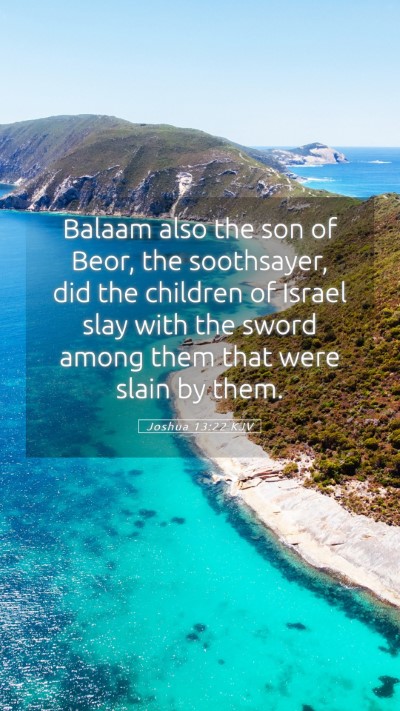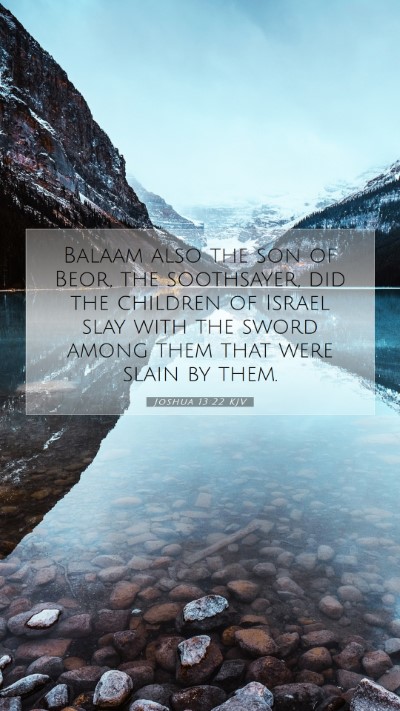Bible Verse Commentary: Joshua 13:22
Joshua 13:22 details the consequences of the sins of the Israelites, specifically mentioning the actions of Balaam. This verse serves as a reminder of the dangers inherent in turning away from God and the subsequent judgments that can ensue. Below is a comprehensive exploration of the verse derived from various public domain commentaries.
Understanding Joshua 13:22
This verse states:
"And Balaam also the son of Beor, the soothsayer, did the children of Israel slay with the sword."
Context and Historical Background
The historical context of Joshua 13:22 plays a crucial role in understanding its significance. The Israelites had completed their wilderness journey and were now settling in the Promised Land. This moment of victory came with the acknowledgment of their past battles and the adversaries, including Balaam, who sought to lead them astray.
Balaam's Role
Balaam, a well-known figure in the Old Testament, represents the challenges and temptations that can seduce God's people. He was a hired prophet who, motivated by greed and the desire for wealth, attempted to curse Israel. Instead, he ended up blessing them, demonstrating that God can turn intended curses into blessings.
Commentary Insights
- Matthew Henry's Commentary: Henry emphasizes the moral lesson from Balaam's demise. He notes that although Balaam possessed spiritual gifts and insight, his pursuit of personal gain led to his downfall. This serves as a caution about the corrupting nature of greed and the importance of remaining faithful to God.
- Albert Barnes' Commentary: Barnes highlights that Balaam's actions were not just those of a singular individual; they symbolize the broader temptations facing the Israelite people. The slaying of Balaam is a final act of judgment against those who would lead God's people astray.
- Adam Clarke's Commentary: Clarke discusses the gravity of Balaam's sin, indicating that his betrayal was not merely about personal failure but also about representing false prophets who mislead believers. Balaam's death serves as an illustration of God's justice against those who oppose His will.
Lessons and Applications
Joshua 13:22 teaches several valuable lessons relevant for today’s believers:
- Resisting Temptation: Just as Balaam succumbed to the lure of profit, believers are encouraged to resist worldly temptations that divert them from their faith.
- The Importance of Discernment: The verse highlights the necessity for discernment in our engagements and associations, understanding that not everyone who appears spiritual has the right intentions.
- God’s Justice: It reassures believers that God’s justice prevails over evil practices, and those who lead others astray will face consequences.
Cross References
Several verses further elucidate the themes presented in Joshua 13:22:
- Numbers 31:8: "And they killed the kings of Midian, beside the rest of them that were slain; namely, Evi, and Rekem, and Zur, and Hur, and Reba, five kings of Midian..." - provides context about Balaam's end.
- 2 Peter 2:15: "Which have forsaken the right way, and are gone astray, following the way of Balaam..." - warns against false prophets.
- Revelation 2:14: "But I have a few things against thee, because thou hast there them that hold the doctrine of Balaam..." - addresses the Church about the dangers of Balaam's teachings.
Conclusion
In conclusion, Joshua 13:22 serves not only as a record of historical events but also as a profound moral lesson that transcends centuries. By understanding this verse through a combination of scriptural and commentary insights, believers gain a deeper appreciation for the implications of their choices and the necessity of steadfastness in faith. This knowledge becomes invaluable for personal Bible study, group discussions, and individual reflections.
For those seeking greater Bible study insights or wishing to explore the meaning of Bible verses, Joshua 13:22 provides a fertile ground for discussion and contemplation.


